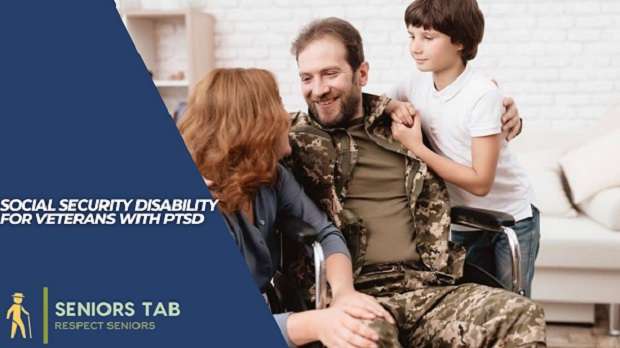Out of the 1.9 million veterans, a staggering 380,000 are afflicted with PTSD, a debilitating condition that can utterly devastate one’s life. The mere conception of this disorder is enough to instill a sense of tragedy, especially if you’ve witnessed its effects firsthand.
PTSD, or Post-Traumatic Stress Disorder, is an anxiety disorder that arises following a traumatic event. This disorder typically manifests after experiencing an event that triggers intense fear, horror, or a similar emotion.
Unfortunately, PTSD is a condition that many veterans face, and it can have an incredibly detrimental impact on their lives. In this article, we will delve into the topic of social security disability for veterans who are struggling with PTSD.
What Is PTSD
If the applicant meets the requirements for Listings 12.15 or 112.15 Trauma- and stressor-related illnesses, the SSA may recognize PTSD as a disability.

The Social Security Administration (SSA) offers Post-Traumatic Stress Disorder (PTSD) disability benefits to individuals whose PTSD symptoms are so severe that they render them incapable of working.
To qualify for PTSD benefits, one must have a confirmed diagnosis of PTSD that meets the medical criteria outlined in the SSA’s Blue Book. This book provides a list of impairments deemed eligible for Social Security disability benefits. It is crucial to confirm that your PTSD diagnosis meets the medical requirements outlined in the Blue Book to be considered eligible for benefits.
Trauma- and stressor-related disorders, which are included in Listing 12.15 in the Blue Book for adults and Listing 112.15 in the Blue Book for children, are the category under which PTSD may qualify as a handicap.
Candidates must meet either parts A and B or sections A and C of the Blue Book listing for trauma- and stressor-related diseases.
The SSA can deem you incapacitated and provide you PTSD disability allowance if you have PTSD and you fulfill one of those two criteria.
As SSDI payments are for individuals who formerly could work but can no longer do so due to a handicap like PTSD, you must fulfill the job standards set out by the SSA for PTSD to be declared a disability.
Age and length of employment are taken into account while calculating labor credits. You can accrue work credits if you’ve made Social Security tax contributions. For each year you work, you are eligible to get up to four work credits.
You will be deemed disabled and could be eligible for PTSD disability payments if you satisfy the job and medical standards listed by the SSA.
Symptoms of PTSD Disability
VA concentrates on the behavioral side effects of PTSD. There are four separate diagnostic symptom clusters, and depending on the cluster, a different number of symptoms must be recognized. It should take a disturbance more than a month to continue.
Re-experiencing
Flashbacks, panic attacks, recurrent nightmares, unwanted, irrational recollections of the traumatic incident, and another severe or protracted emotional suffering.
Avoidance
Extremely avoiding the traumatic event’s unpleasant memories, persons, ideas, feelings, or external reminders.
Negative thoughts and feelings
Adverse mood changes cover a wide range of unpleasant emotions, such as persistent and distorted feelings of survivor’s guilt, the blame of oneself or others, feelings of loneliness or noticeably diminished interest in daily activities, as well as a failure to remember important details of the traumatic event.
Arousal
These signs include violent outbursts, aggressive or risky conduct, sleep disorders, difficulty focusing, hypervigilance, and jumpiness, as well as other issues.
The “fight” reflex frequently experienced by PTSD sufferers is also explained by symptoms.
Benefit For PTSD
Veterans in our country frequently get PTSD due to the nature of military service. You can see violence and battle while serving in the military. You may have suffered missions that put your life in danger or gone through surprising, horrifying experiences.
A veteran who is already scared, apprehensive, on edge, or bewildered is further stressed by difficult circumstances outside of war.
These include hostile or inhospitable settings, sexual abuse suffered while serving, or, to mention a few, the heartbreaking death of a friend. All might contribute to the life-altering symptoms of PTSD and other mental illnesses.
Veterans occasionally are unaware that they may be eligible for disability compensation for PTSD under the SSDI PTSD veteran Disability and VA programs. Don’t pass up the chance to get disability compensation from many sources.
It’s equally crucial to not take the chance of having your initial PTSD disability claim denied or losing an appeal because you lack qualified legal counsel.
The interactions between the two agencies might become challenging. This article outlines what it takes to be eligible for either one or both disability programs if you are a veteran with a PTSD diagnosis.
How To Get Social Security Disability For Veterans With PTSD

To Get Social Security Disability For Veterans With PTSD –
You have a valid PTSD diagnosis, the stressor occurred while you were serving in the military (service link established), and as a result of your symptoms, you are unable to carry out daily activities as you once could.
If you file a claim that satisfies these requirements, VA will probably determine that you are eligible for disability benefits.
Although it might seem simple, there are a lot of requirements that must be met for your condition to qualify as service-connected. You will have a C&P exam, and your case will go through VA’s screening procedure.
You may like: Free RVs For Disabled Veterans
Based on how severe your symptoms are, the VA may rate your PTSD at 0, 10, 30, 50, 70, or 100%. Using the General Rating Formula for Mental Disorders, the VA will take into account each of your mental impairments individually.
Understand Your PTSD Rating to learn how the VA evaluates PTSD and how the C&P assessment impacts your claim.
Your illness can potentially be regarded as a handicap for veterans’ benefits after it satisfies all of the VA’s criteria for PTSD.
Final Verdict
If your post-traumatic stress disorder (PTSD) is hindering you from working, you may qualify for Social Security Disability Insurance (SSDI) or Supplemental Security Income (SSI).
To obtain more information, you can complete a brief evaluation form about your circumstances with no obligation.
Collaborating closely with medical professionals, an experienced Social Security disability attorney, or a disability advocate can assist in gathering and presenting the requisite evidence to substantiate your disability claim before the Disability Determination Services (DDS), boosting the likelihood of success in your PTSD disability case.
That is how you can acquire social security disability benefits for veterans with PTSD.
